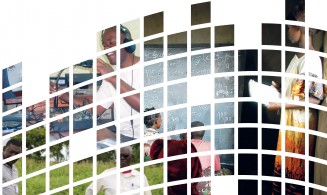

Shedding Light on Adult Learning and Education in the Asia-Pacific Region
grale-iii-launch-asia-pacific.jpg

In a special Thai celebration to launch the third Global Report on Adult Learning and Education (GRALE III) in the Asia-Pacific region, participants lit candles to symbolize the light shed by the report on the important issue of adult learning and education (ALE). The launch event, which took place from 24 to 26 November 2016, in Bangkok in Thailand, was part of a Policy Forum on Youth and Adult Learning and Education, co-organized by International Council for Adult Education (ICAE), the Asia South Pacific Association for Basic and Adult Education (ASPBAE), the Institute for International Cooperation of the German Adult Education Association (DVV International), UNESCO Bangkok and the UNESCO Institute for Lifelong Learning (UIL). More than 100 participants representing governments, civil society organizations, donor agencies and other stakeholders from 26 countries took part in the launch.
Mixed Progress of ALE in the Asia-Pacific Region
The findings of GRALE III are based on an extensive survey of 139 countries, including 28 (of 49) Asia-Pacific countries. The report shows that progress in the region has been mixed despite countries’ efforts to improve their ALE policies and practices since the 2009 Belém Framework for Action was adopted, indicating the need for further investment in ALE. Particularly, data on the region shows that:
- 456 million adults in Asia-Pacific region remain Illiterate.
- 40% of countries in the Asia-Pacific region developed a policy framework for recognition, validation and accreditation (RVA) after 2009, but 24% still have no policies for RVA.
- 47% of Asia-Pacific countries spend less than 1% of their public education budgets on ALE.
- 89% of countries in Asia and the Pacific provide pre-service and in-service training for ALE educators and facilitators.
Implementing the 2030 Agenda and Sustainable Development Goal 4
The GRALE III launch and Policy Forum also provided valuable opportunities to explore the challenges involved in the implementation of Sustainable Development Goal 4 (SDG 4) on education.
Considering the UNESCO Report on Rethinking Education which was also presented by the UIL team at the launch, participants agreed that decision-makers in the region would need to look beyond literacy and numeracy in working towards achieving the goals of education. In the debate, four key concerns were identified as essential in cultivating an understanding of education as a common good: equity, responsibility, transparency and trust.
Participants also discussed the need for countries to:
- protect the right to education;
- reinforce non-formal modes of education;
- improve learning environments;
- promote multi-stakeholder approaches, including involving civil society from the outset.
Representatives from Bangladesh, India and Thailand were among those who joined a discussion led by UIL experts on the links between ALE and health. As indicated in GRALE III, ALE can create an environment within which health opportunities can be provided to all, thereby leading to healthier individuals and societies. Participants agreed on the need to promote a strong holistic, inter-sectoral approach, which requires working across sectors, guided by the urgent requirement for deeper partnerships. This will help promote health and wellbeing and contribute to the achievement of the SDGs.








